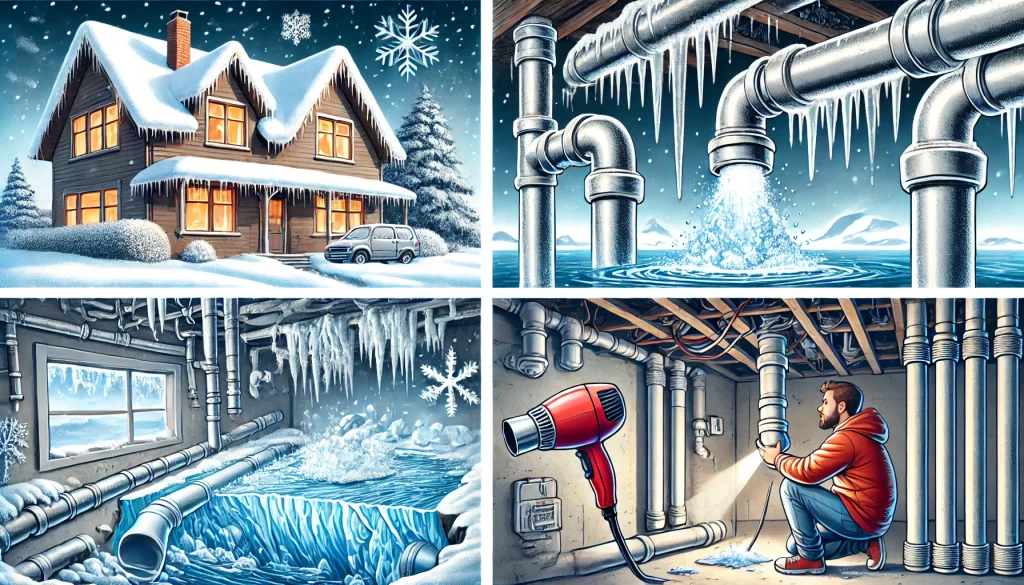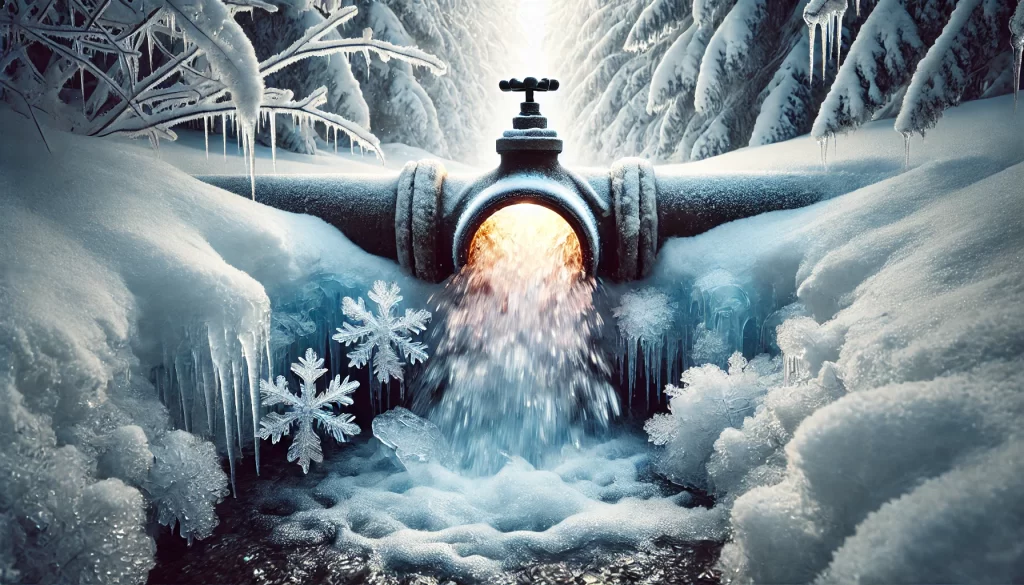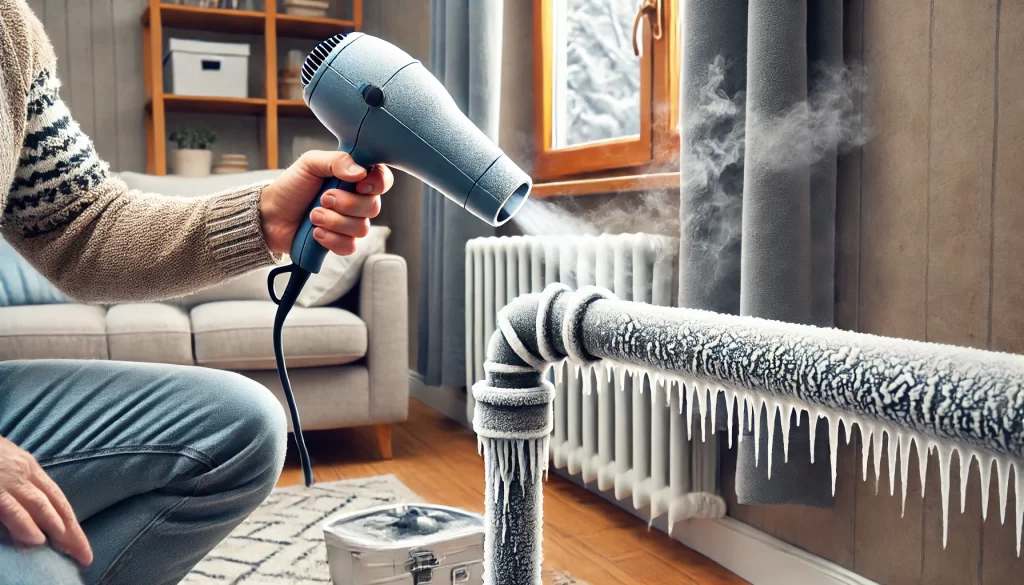Table of Contents
Winter can be harsh, especially for your home’s plumbing system. One of the most common concerns for homeowners is frozen pipes. How long does it take for pipes to freeze? The answer depends on temperature, insulation, and water flow. How long does it take for pipes to freeze can vary from a few hours in extreme cold to even longer in milder conditions. In this article, we will explore how long does it take for pipes to freeze, the factors that affect freezing, and the steps you can take to prevent it. Let’s dive in and reveal the shocking truth behind how quickly pipes can freeze in cold weather.
How Long Does It Take for Pipes to Freeze? What Causes Pipes to Freeze?

Pipes freeze when exposed to freezing temperatures, typically below 32°F (0°C). The water inside the pipes solidifies into ice, which can create pressure and cause the pipes to burst. However, how long does it take for pipes to freeze depends on more than just the temperature—many other factors come into play, such as insulation and water flow. Understanding how long does it take for pipes to freeze in different conditions can help you take preventive measures to avoid costly damage.
Location of Pipes Matters
These spaces are more exposed to cold air and lack the warmth to prevent freezing.
Insulation Levels Play a Role
Well-insulated pipes are less likely to freeze than those with poor insulation. However, if your pipes are not properly insulated, they lose heat faster, which leads to freezing, even in temperatures slightly above freezing.
Water Movement Affects Freezing Time
Did you know moving water takes longer to freeze? Regularly used pipes have a constant flow of water, which delays freezing. On the other hand, pipes with stagnant water are more likely to freeze quickly.
How Long Does It Take for Pipes to Freeze?
The answer to how long it takes for pipes to freeze depends on various factors, such as temperature, location, insulation, and water flow. Understanding these elements is crucial in determining the risk of freezing and taking the necessary precautions to prevent damage to your pipes during cold weather.
Freezing at 32°F (0°C)
At the freezing point (32°F or 0°C), pipes can freeze in 6 to 8 hours. However, this timeline varies depending on insulation and water flow in the pipe. Well-insulated pipes may take longer to freeze, while uninsulated pipes may freeze quicker.
Extreme Cold Conditions
When temperatures drop significantly below freezing, around 20°F (-6°C) or lower, pipes can freeze in as little as 1 to 2 hours. If the weather forecast predicts temperatures in this range, it is essential to take your pipes.
The Impacll
Wind chill can speed up freezing, especially for pipes exposed to cold winds. A chilly breeze can cool pipes down more rapidly, reducing their freeze time.
Why Do Frozen Pipes Matter?

Frozen pipes are more than just a nuisance; they can lead to significant damage. Understanding how long does it take for pipes to freeze is crucial because the faster they freeze, the higher the risk of bursting, which can result in costly repairs and water damage to your home.
Burst Pipes and Water Damage
When water freezes inside the pipe, it expands, putting immense pressure on the walls. This can lead to cracks or bursts, resulting in costly water damage to your home.
Expensive Repairs
Fixing frozen pipes and the resulting water damage can be expensive. Plumbers may need to replace the damaged pipe, and you may need to repair the walls, floors, and ceilings affected by the water.
Health Hazards
In severe cases, water damage from burst pipes can lead to mold growth, which poses health risks to your family. Mold thrives in damp environments and can spread quickly once it starts growing.
How to Prevent Pipes from Freezing
Preventing frozen pipes is more accessible than dealing with the aftermath. To avoid the costly damage that frozen pipes can cause, it’s important first to understand how long does it take for pipes to freeze and then take action accordingly. Here are some practical tips you can follow to prevent pipe freezing.
Insulate Your Pipes
Use pipe insulation or heat tape, especially in cold air areas like basements or garages.
Keep Water Flowing
A small trickle of water from your faucets can prevent pipes from freezing. Moving water doesn’t freeze as quickly as still water, so allowing a slow drip can help.
Seal Leaks and Cracks
Cold air can enter your home through cracks or leaks in the walls. Sealing these openings will reduce the cold air in contact with your pipes, lowering the risk of freezing.
Maintain Indoor Temperatures
Even if you’re away from home, keep your thermostat set to at least 55°F (13°C) to prevent pipes from freezing. Maintaining a constant indoor temperature can avoid cold spots in your home.
What to Do If Your Pipes Freeze
If you suspect your pipes have frozen, acting quickly to minimize damage is crucial.
Turn Off the Water
Shut off the main water valve to prevent water from flowing into the frozen section of the pipe. This step will reduce the risk of the pipe bursting if it thaws.
Thaw the Pipe Safely
Use a hairdryer or space heater to warm the frozen section of the pipe gradually. Never use an open flame, which can cause the pipe to burst or create a fire hazard.
Call a Professional
If you can’t thaw the pipe alone or notice any leaks, it’s best to call a professional plumber. They can safely thaw the pipe and make any necessary repairs.
Also Read: How Long Does Balayage Take? Shocking Time You’ll Love or Hate!
How Much Time Does It Take for Thawing Pipes?
Thawing can take time once a pipe is frozen, especially if the weather remains cold.
Thawing Time Depends on Pipe Size
The size of the pipe and the frozen section will determine the time it takes to thaw. Smaller pipes may thaw within an hour, while larger pipes can take several hours.
Use of Heating Tools
Using a space heater or hairdryer can speed up the thawing process. The time it takes to thaw a frozen pipe also depends on the tool used and the cold surrounding area.
How long does it take for pipes to freeze? The answer depends on factors like temperature, insulation, and water movement. However, the potential damage caused by frozen pipes should not be taken lightly. With proper precautions, like insulating pipes and maintaining a constant indoor temperature, you can protect your home from costly repairs.
If you’re wondering whether your pipes are at risk of freezing, remember that it only takes a few hours in extreme cold for them to freeze. Take preventive measures today to stay ahead of winter weather.



